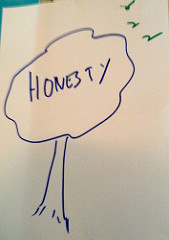Breaking up is hard to do. There are wrong ways to do it, better ways to do it, but regardless of what goes down, ending a relationship through breaking up, divorce, or other ways is a process and a transition. No matter what happens, there will be pain. Here are just some thoughts about how to break up in the best possible way.
Whether going through a break up, divorce, or ending a job or other type of relationship, I always speak of four characteristics that are essential to any of these types of conversations. Provided a person acts with all four of the following character assets, no matter what the message, it will be less painful and more productive.
Four Horsepeople of the Disclosure
(a play on the Four Horsemen of the Apocalypse from John and Julie Gottman)
Honesty
Kindness
Respect
Integrity
My basic argument is this: no matter what you have to say and who you have to say it to, if you speak your truth with honesty, kindness, respect, and integrity, you did all that you could do to maybe share a painful message in a more productive way. Telling someone no or no thank you is hard, and likely will be painful for both on some level. NO ONE LIKES TO BREAK UP. In fact, so many people don’t like to end a relationship (with a partner, friend, lover, employer) that many would rather stay in the painful relationship than SAY NO or end it. They choose to suffer over speaking their truth and feeling that pain. To me, it isn’t worth it.
I believe that if you deliver a message with kindness, honesty, respect, and integrity, you have done all you can do to minimize the hurt caused by a painful message. So just keep repeating these in your head when you have to deliver a tough message:
Am I being kind? (to myself and others)
Am I being honest? (with myself and others)
Am I being respectful? (to myself and others)
Am I acting with integrity?
That last one might not be completely obvious since many people, when asked, don’t know how to define integrity. What is integrity? How would you define acting with integrity?
Various definitions exist out there but the one I think I liked the best went something like this: integrity is the concept of CONSISTENCY of actions, values, methods, measures, principles, expectations, and outcomes and the honesty and truthfulness of ones actions. That word consistency is essential to our next discussion about ending a relationship with a high level of integrity.
Consistency
Somewhere along the way in my career, I read somewhere that the best way to break up with someone is through continuous reinforcement. What this looks like reminds me of the early behaviorism experiments with the rats and the lever- Skinner Boxes and Operant Conditioning and schedules of reinforcement. Basically, there was a rat, in a box. He presses a lever and gets a pellet. Every time. So he learns that the lever gives the pellet. That is continuous (consistent) reinforcement. Best way to establish/extinguish a behavior- continuous reinforcement (lever-pellet or lever-no pellet).
Without getting all Bill Nye on everyone, the other schedules of reinforcement are more challenging to establish/extinguish. So how this all applies is that when you break up with someone, and you end it, and continuously reinforce that ending, it is healthier in the end, than intermittently reinforcing through break up sex, living with each other after the break up, gradually moving out of the break up with intermittent reinforcement of the relationship and the break up (we go to this wedding as a couple, even though we are broken up… confusing) etc. etc. There are a million of examples of people doing confusing things during a break up that winds up prolonging suffering. Here are some facts via youtube, our generations encyclopedia AND how-to manual. Not super relevant but it goes more into the theory.
Now I’m not suggesting a complete shut down and shut off of the other person during a break up. Break ups are really painful and that wouldn’t be treating that other person with kindness, respect, or integrity. But its important that the break up is continuously reinforced out of kindness, respect, and HONESTY for the both parties that the relationship is over.
Why Dragging it Out is More Damaging and Painful In The Long Term
Often times, break ups get dragged out for a variety of reasons: finances, living situations, mutual friends, life transitions, pets, kids, family and often because there is a sense of ambivalence or confusion about the decision to break up. I often see what we call “polarized relationships” where one wants out, and the other does not OR couples where it is Too Good to Leave, Too Bad To Stay.
The problem with ambivalent or polarized couples is that change is inevitable but strongly resisted so the suffering just increases, increases, and increases. The lack of decision only leads to longer damage and often results in a crisis (affair, blow up, accelerated break up) instead of a more kind, respectful, thoughtful break up.
And with ambivalent relationships, when one or more isn’t sure if they want to go or not, it is important that there is the option to COME BACK if both parties choose to. And by not making decisions often leaves this option NOT an option because so much damage occurs during this period the couple passes the point of no return. If you want to preserve the relationship, it is better to work with a therapist on a planned or controlled separation (Should I Stay or Should I Go: How Controlled Separation Can Save Your Marriage) or go through a course of discernment counseling (a short-term model of counseling that aims at three paths- status quo, divorce/separation, or a six month commitment to couples therapy).
Not acting and having it blow up could leave more wreckage that might not be able to be salvaged if the two (or more) of you decide to reconcile down the road. If you aren’t sure, its better to get the help to decide rather than let things stay the same.
Reasons to Break Up
The decision to break up and end a relationship is a deeply personal one and shouldn’t be made lightly. I reference Dr. Stan Tatkin’s books Wired for Dating and its marriage/relationship counterpart Wired for Love
a lot in my work with relationships. In Tatkin’s (2016) book Wired for Dating , he discusses 18 questions to consider when deciding if you should say goodbye. They are posted below:
- Do you or this partner have one foot in and one foot out of the relationship?
- Is it hard for you or this partner to feel relaxed and comfortable around each other?
- Is it hard for you or this partner to feel safe and secure around the other?
- Has any abuse or violence occurred in this relationship?
- Do you or this partner resist having sex with the other?
- Are you or this partner strongly an island or wave? [text will explain this further]
- Do you find it hard to tell how this partner is feeling?
- Does this partner show little or no interest in your feelings?
- Do you or this partner find it hard to calm or soothe the other?
- Do you or this partner ever let thirds (such as people or tasks) take precedence over the relationship? (Note: This could include cheating or betrayal, but it doesn’t have to get that far.)
- If you or this partner feels hurt or injury, does the other fail to repair it right away?
- Have you and this partner tried to talk over your differences, but failed?
- Do you and this partner fight frequently, nastily, or without resolution? (Note: This question is not whether you fight at all).
- Have you or this partner already tried on one or more occasions to break up?
- Do you and this partner keep secrets from each other?
- Do you have no sense of future with this partner?
- Did vetting with either your or this partners family and friends yield negative results?
- Would you say a couple bubble has not even begun to form for you and this partner? (179-180)
In my podcast, love.sex.atx, we recently had an episode that discussed breaking up and moving forward. We talk a lot about how breaking up is a life transition and a journey, and often times necessary for growth, learning, and development, albeit painful. Take a listen to episode 1:10 our Season Finale, and where an on-air break up actually occurs!
Going through a break up or thinking about breaking up with your partner? Reach out to me- I specialize in working with individuals as they decide to stay or go and can offer referrals for the relationship.


